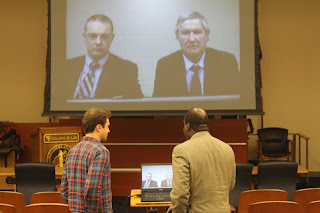
On Thursday November 4th Atiba Ellis organized a panel discussion with Professors Stephan Padfield and Wilson Huhn from the University of Akron. The panel was a perfect intersection of the issues that this blogs raises and the issues that I have been struggling with all semester: using new technology to incorporate case law across the curriculum. In this case, the new technology was Skype, which allowed us to engage in a two way video conferencing format: the professors at Akron could see us; hear the students questions and respond in real time. The "law" that they were discussing was the Citizens United case that (as mentioned in an earlier post) Atiba and I have been using as a means of engaging the students in issues of corporate law, constitutional law, and election law. In that way, the panel (taking place two days after the latest elections) was timely. Atiba mentioned the recent elections in his remarks and the professors at Akron elaborated and built on that in their reponses to student's questions.

The downside? The technology didn't work completely. What this blog entry was supposed to be, was a post with initial remarks from me followed by the video, so you could see for yourself how the Skype teachnology worked. Instead, because the technology didn't manage to record the event, you are left with my observations on the matter (supplemented with pictures to provide you with context).

So here are my observations:
I think that using technology in this way allowed the students to engage differently than they can with other formats. This is the digital generation, the students who grew up with mobile phones and text messaging; the ones who are accustomed to getting their questions answered instantly with a laptop and a wireless connection. Showing these students that we can engage with them using a technology they understand is invaluable in helping us to connect with them as teachers.
I've been thinking about this a lot in preparing for our upcoming presentation at the S.A.L.T. conference - using the intersection of technology and case law to connect with our students. Specifically, what is it about what we're doing (by having our students blog, have them use video, use a recent supreme Court case) that makes it different from previous methods of teaching?
Let's be honest, the idea of having one case that touches on multiple subject matters is not new - my students often tell me of finding a case that they've read in one class's casebook being used in another casebook for a different subject. That makes sense- one judge can touch on a multitude of different legal theories in a single opinion; it's only natural that different casebook authors (and law school teachers) would use a portion for their own purposes.
So what makes our experiment so different? The conclusion I've reached (which I'm still thinking through) is that it's the combination of the timeliness, the technology and the richness of the case that makes this an effective way to teach to students. Unlike cases that have already been compiled and edited for casebook purposes - Citizens United is new, the Supreme Court just decided the case this year. In addition, my students had to read it unabridged, no editing or censoring on my part. Finally, my students had to use technology (by blogging at least twice throughout the semester) to think through the issues that Citizens United raised. It was almost as if they were defining for themselves what Citizens United meant across all these different areas of the law: they were analyzing it; massaging it; trying to firgure out how it all fit together in a way that I think they could not have done without blogging. And then, to hear some of the thoughts that they had struggled with being echoed by professors and scholars ... the feedback that I've had so far has been overwhelmingly positive. As one student in business organizations class noted -it was like bringing in all these different threads together.
So, while it would have been nice to have had a video to record the moment (and the four professors have decided that we are going to have a wrap up session which we will record and post) I think the far more valuable thing that this panel (and this semester) has shown me is that, if you take the time to think about different ways you can engage your students and you supplement that with timely issues that they want to understand, the results can be astounding...
No comments:
Post a Comment